-
 Bitcoin
Bitcoin $104,224.1974
1.01% -
 Ethereum
Ethereum $2,560.3829
9.12% -
 Tether USDt
Tether USDt $1.0001
0.02% -
 XRP
XRP $2.4174
1.83% -
 BNB
BNB $663.5043
-1.34% -
 Solana
Solana $177.4403
3.04% -
 USDC
USDC $1.0000
0.01% -
 Dogecoin
Dogecoin $0.2429
16.33% -
 Cardano
Cardano $0.8208
4.26% -
 TRON
TRON $0.2649
0.31% -
 Sui
Sui $4.0677
1.34% -
 Chainlink
Chainlink $17.0611
5.71% -
 Avalanche
Avalanche $25.5486
8.39% -
 Stellar
Stellar $0.3148
4.71% -
 Shiba Inu
Shiba Inu $0.0...01654
8.84% -
 Hedera
Hedera $0.2151
5.77% -
 Toncoin
Toncoin $3.5072
5.98% -
 Hyperliquid
Hyperliquid $25.8795
4.49% -
 Bitcoin Cash
Bitcoin Cash $428.3413
2.84% -
 Polkadot
Polkadot $5.1326
3.07% -
 Litecoin
Litecoin $104.9330
0.87% -
 UNUS SED LEO
UNUS SED LEO $8.2670
-4.90% -
 Monero
Monero $326.7171
5.26% -
 Pi
Pi $0.8475
15.23% -
 Bitget Token
Bitget Token $4.9279
7.16% -
 Pepe
Pepe $0.0...01320
5.67% -
 Dai
Dai $0.9999
-0.02% -
 Ethena USDe
Ethena USDe $1.0002
0.02% -
 Uniswap
Uniswap $7.3533
13.01% -
 Bittensor
Bittensor $461.6048
6.94%
How to verify a Bitcoin wallet address?
Verifying a Bitcoin address involves assessing risk, not confirming ownership, by checking transaction history on blockchain explorers and using reputable (but not foolproof) third-party tools; irreversible loss of funds is the consequence of insufficient due diligence.
Feb 27, 2025 at 06:06 pm
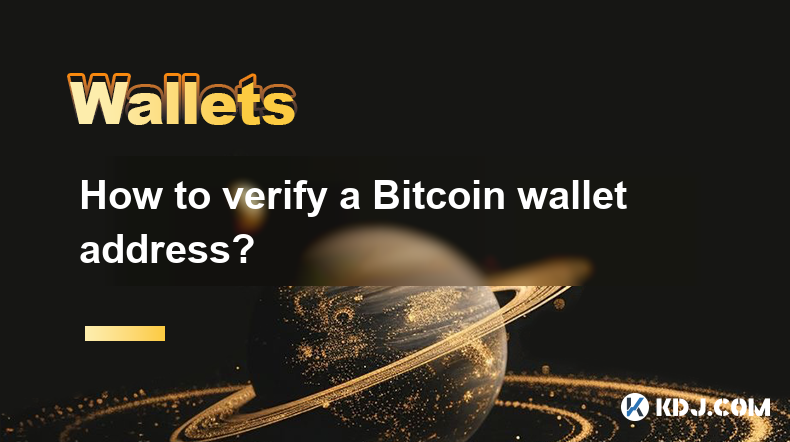
How to Verify a Bitcoin Wallet Address: A Comprehensive Guide
Key Points:
- Understanding Bitcoin Addresses: Bitcoin addresses are cryptographic hashes, not actual accounts. They are essentially one-way functions, meaning you can easily generate an address from a private key, but you cannot reverse engineer the private key from the address. This is crucial for security. Misunderstanding this fundamental aspect is the source of many verification errors.
- Methods of Verification: There isn't a single "verification" process for a Bitcoin address like verifying an email address. Instead, verification focuses on confirming the address's legitimacy and ensuring it's not associated with fraudulent activity or compromised wallets. This involves checking for red flags, tracing transaction history (on the blockchain), and using reputable tools.
- Importance of Due Diligence: Before sending Bitcoin to any address, thorough verification is paramount. Losing your Bitcoin to a fraudulent or compromised address is irreversible. The time spent verifying an address is a small price to pay for the security of your funds.
- Tools and Resources: Several tools and resources can assist in verifying a Bitcoin address, though none provide absolute certainty. These tools provide insights into the address's history and potential risks.
- Understanding the Nature of Bitcoin Addresses and Their Limitations:
A Bitcoin address is a unique identifier, similar to an email address, but with crucial differences. Unlike an email address associated with an individual or entity, a Bitcoin address is generated from a cryptographic key pair – a public key and a private key. The public key is used to generate the address, which is then shared with others to receive Bitcoin. The private key, however, must be kept absolutely secret, as it provides complete control over the Bitcoin associated with that address.
The address itself is a cryptographic hash, meaning it's a one-way function. You can generate an address from the public key (and thus, indirectly, from the private key), but you cannot derive the public or private key from the address. This one-way function is essential for security; otherwise, anyone could reverse-engineer the private key and steal your Bitcoin.
Verification of a Bitcoin address, therefore, doesn't involve confirming its ownership with a central authority. Instead, it focuses on assessing the risk associated with sending Bitcoin to that address. This includes checking for known fraudulent addresses, reviewing the transaction history to identify any suspicious patterns, and verifying the address's source (e.g., ensuring it came from a trusted source, not a phishing email). Even after thorough investigation, there's always a residual risk, as the decentralized and pseudonymous nature of Bitcoin makes absolute certainty impossible. The process is about mitigating risk, not eliminating it entirely.
- Examining the Transaction History of a Bitcoin Address on a Blockchain Explorer:
Blockchain explorers are websites that allow you to view the public transactions on the Bitcoin blockchain. These explorers provide a wealth of information about a specific Bitcoin address, including its transaction history, the total amount of Bitcoin received and sent, and the associated timestamps. By examining this history, you can assess the address's legitimacy and identify any potential red flags.
For example, a newly created address with no prior transactions might be legitimate, but it could also be a newly generated address used for fraudulent activities. Similarly, an address with a history of receiving and quickly sending large amounts of Bitcoin could be associated with money laundering or other illicit activities. However, it's crucial to remember that many legitimate users also conduct frequent transactions. Context is key, and simply observing frequent transactions doesn't automatically indicate fraudulent behavior.
Using a reputable blockchain explorer is vital. Ensure the explorer you use is well-known and trusted within the Bitcoin community. These explorers employ robust security measures to protect user data and ensure the accuracy of the displayed information. Comparing data across multiple explorers can further enhance confidence in the accuracy of the transaction history. Remember, even reputable explorers can experience delays in updating transaction information, so allow for a reasonable timeframe before making a judgment. A seemingly inactive address might simply be awaiting a transaction that hasn't yet been confirmed.
- Utilizing Third-Party Verification Tools and Services (with Cautions):
Several third-party services claim to verify Bitcoin addresses or provide risk scores. However, it's crucial to approach these services with extreme caution. While some legitimate services offer valuable insights, others might be scams or provide inaccurate information. Always research a service thoroughly before using it, paying close attention to user reviews and security protocols. Never entrust your private keys or seed phrases to any third-party service.
These services often analyze an address's transaction history, comparing it against databases of known fraudulent or compromised addresses. They might also assess the address's age, the frequency of transactions, and the amounts involved. The results are often presented as a risk score or a simple "legitimate" or "suspicious" label. However, these scores should be interpreted cautiously, as they are not foolproof. A low risk score doesn't guarantee the address is safe, and a high risk score doesn't necessarily mean it's fraudulent. These tools should be used as one piece of the puzzle, not as the sole basis for your decision. Always supplement their analysis with your own due diligence, including manually examining the transaction history on a reputable blockchain explorer.
- Cross-Referencing Information from Multiple Sources and Employing Common Sense:
The most effective approach to verifying a Bitcoin address is to cross-reference information from multiple sources. Don't rely on a single source, be it a third-party verification tool, a single blockchain explorer, or a recommendation from a single individual. Compare the information you gather from different sources, looking for consistency. Discrepancies should raise red flags.
Employing common sense is also crucial. If an offer seems too good to be true, it probably is. Be wary of unsolicited requests to send Bitcoin to unfamiliar addresses, especially those associated with promises of high returns or unexpected windfalls. If you receive a Bitcoin address from an email, a social media message, or a website, independently verify the source's legitimacy before sending any funds. Check for typos or inconsistencies in the address itself. A single incorrect character can render the address unusable, leading to the irreversible loss of your Bitcoin. Always double-check, triple-check, and then check again.
FAQs:
Q: Is there a definitive way to verify a Bitcoin address?
A: No. There is no central authority that verifies Bitcoin addresses. Verification involves assessing risk through various methods, including checking transaction history, using third-party tools, and employing common sense. There's always a residual level of risk.
Q: What should I do if a verification tool flags an address as suspicious?
A: Don't send Bitcoin to that address. Further investigate the address using multiple blockchain explorers and cross-reference the information. If the suspicion persists, avoid the address entirely.
Q: Can I reverse a Bitcoin transaction if I send it to the wrong address?
A: No. Bitcoin transactions are irreversible. Once a transaction is confirmed on the blockchain, it cannot be reversed. Thorough verification is crucial to prevent this.
Q: Are all third-party verification tools reliable?
A: No. Always research any third-party tool before using it, verifying its reputation and security measures. Never rely solely on a single tool; use multiple sources to cross-reference information.
Q: What if I receive a Bitcoin address from a seemingly trustworthy source but am still unsure?
A: Err on the side of caution. It’s better to delay a transaction and conduct further verification than to risk losing your Bitcoin. Contact the source directly through a verified channel (not the original communication method) to confirm the address's legitimacy.
Q: How often should I verify a Bitcoin address?
A: Always verify a Bitcoin address before sending any Bitcoin. The frequency depends on the context. If sending to a new address for the first time, thorough verification is essential. For addresses you've used previously and trust, you might not need as extensive a check each time, but regular review of the transaction history is recommended.
Q: What are the consequences of sending Bitcoin to an incorrect or fraudulent address?
A: You will lose your Bitcoin permanently. There is no way to recover funds sent to the wrong address, regardless of the reason. This highlights the critical importance of meticulous verification.
Disclaimer:info@kdj.com
The information provided is not trading advice. kdj.com does not assume any responsibility for any investments made based on the information provided in this article. Cryptocurrencies are highly volatile and it is highly recommended that you invest with caution after thorough research!
If you believe that the content used on this website infringes your copyright, please contact us immediately (info@kdj.com) and we will delete it promptly.
- Ruvi (RUVI) is the Next Big Thing in Crypto, Combining Blockchain and AI
- 2025-05-11 10:20:12
- New players have entered the Bitcoin field, leading the previous cycle prediction to no longer be correct
- 2025-05-11 10:20:12
- Dogecoin (DOGE) Shows Strong Upward Signs, Could Push Toward $0.65
- 2025-05-11 10:15:23
- The volatility of XRP prices has attracted widespread attention in the cloud mining space
- 2025-05-11 10:15:23
- Bitcoin Just Crossed $100,000, Here Are 5 Altcoins to Buy the Dip
- 2025-05-11 10:10:12
- Shiba Inu Whales Now Transfer 2.79 Trillion SHIB Tokens Within the Past 24 Hours, After a Period of Declining Engagement
- 2025-05-11 10:10:12
Related knowledge
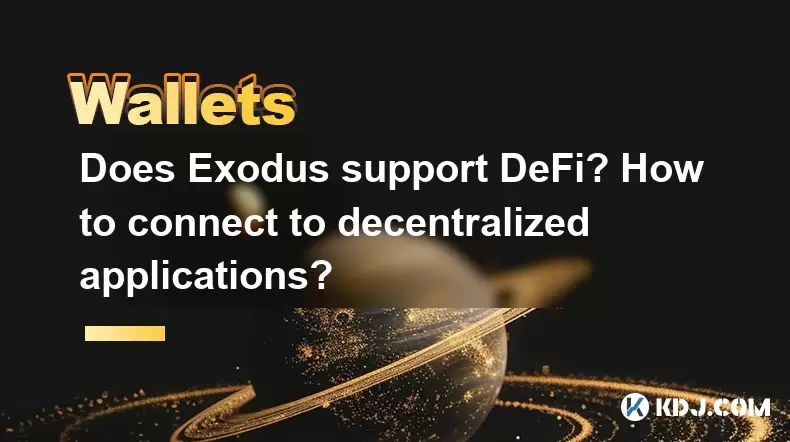
Does Exodus support DeFi? How to connect to decentralized applications?
May 10,2025 at 08:36pm
Does Exodus Support DeFi? How to Connect to Decentralized Applications? Exodus is a popular cryptocurrency wallet known for its user-friendly interface and support for a wide range of cryptocurrencies. However, one of the frequently asked questions among users is whether Exodus supports DeFi (Decentralized Finance) and how to connect to decentralized ap...
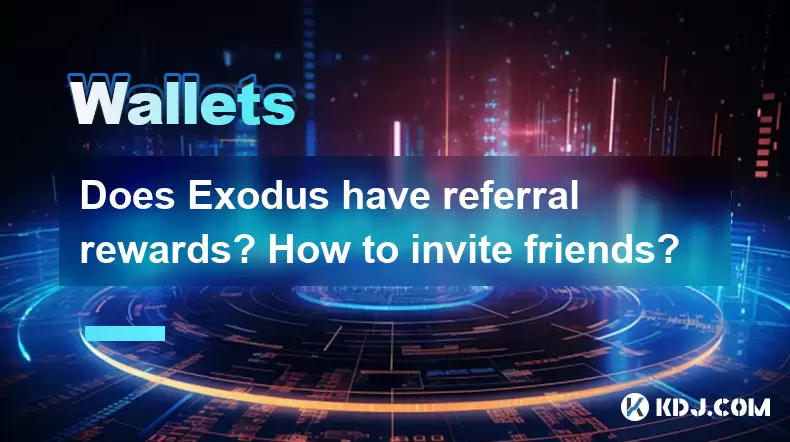
Does Exodus have referral rewards? How to invite friends?
May 09,2025 at 10:01pm
Does Exodus have referral rewards? How to invite friends? Exodus, a popular cryptocurrency wallet, has gained a significant user base due to its user-friendly interface and robust features. One common question among users is whether Exodus offers referral rewards and how to invite friends to join the platform. In this article, we will explore these topi...
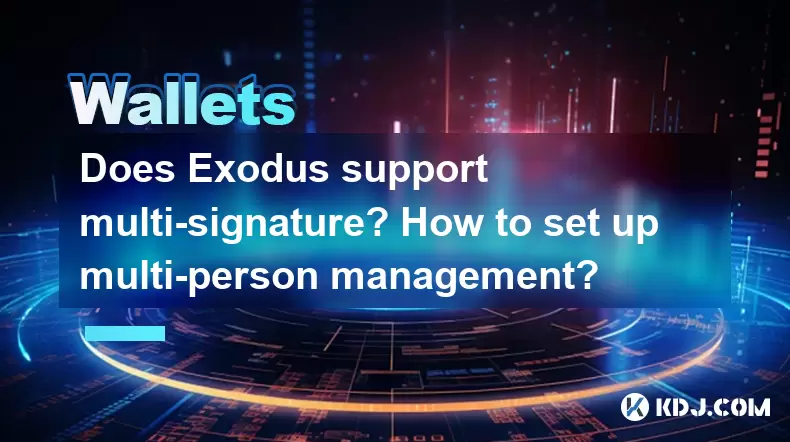
Does Exodus support multi-signature? How to set up multi-person management?
May 11,2025 at 12:01am
Does Exodus Support Multi-Signature Wallets?Exodus, a popular cryptocurrency wallet known for its user-friendly interface, does not currently support multi-signature wallets. Multi-signature (multi-sig) wallets are a type of wallet that requires more than one private key to authorize a transaction, enhancing security by requiring multiple parties to agr...
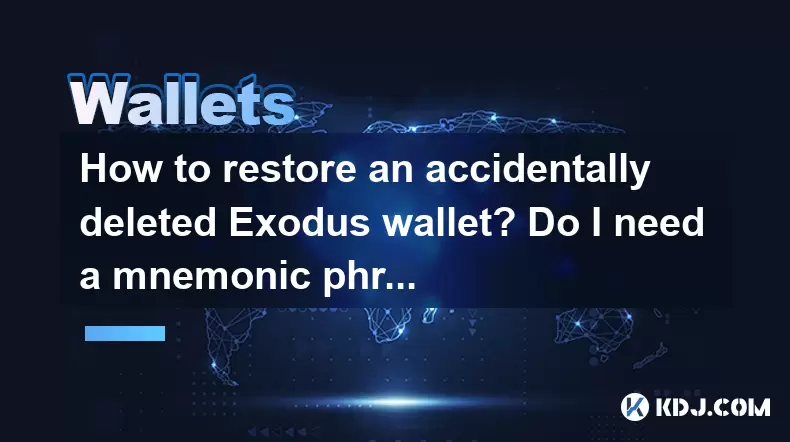
How to restore an accidentally deleted Exodus wallet? Do I need a mnemonic phrase?
May 11,2025 at 02:29am
Restoring an accidentally deleted Exodus wallet can be a stressful experience, but with the right information and steps, you can recover your funds safely. The process involves using your mnemonic phrase, which is crucial for accessing your wallet and its contents. In this article, we will guide you through the steps to restore your Exodus wallet, expla...
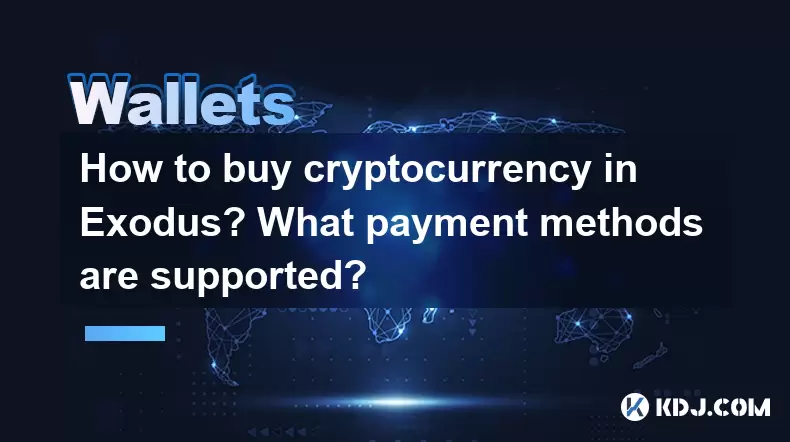
How to buy cryptocurrency in Exodus? What payment methods are supported?
May 10,2025 at 01:29am
How to Buy Cryptocurrency in Exodus? What Payment Methods Are Supported? Exodus is a popular multi-currency wallet that allows users to store, manage, and trade a variety of cryptocurrencies. One of its standout features is the ability to buy cryptocurrency directly within the wallet, making it a convenient option for many users. In this article, we wil...
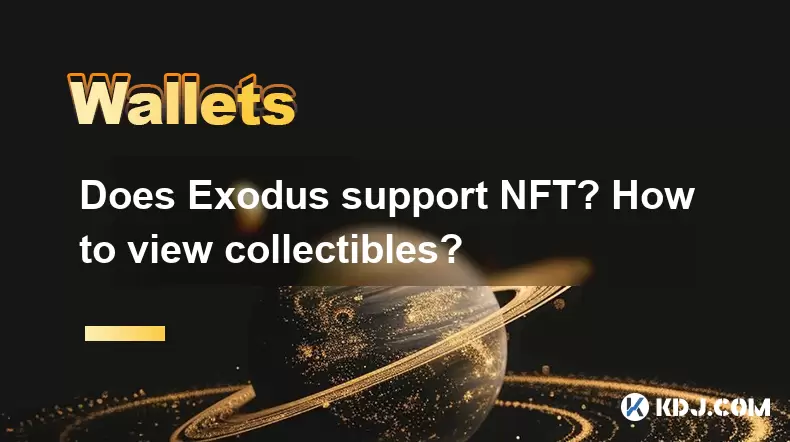
Does Exodus support NFT? How to view collectibles?
May 11,2025 at 09:35am
Does Exodus support NFT? How to view collectibles? Exodus is a popular cryptocurrency wallet that offers a user-friendly interface and supports a wide range of cryptocurrencies. With the rise of non-fungible tokens (NFTs), many users are curious about whether Exodus supports NFTs and how to view their collectibles within the wallet. This article will de...

Does Exodus support DeFi? How to connect to decentralized applications?
May 10,2025 at 08:36pm
Does Exodus Support DeFi? How to Connect to Decentralized Applications? Exodus is a popular cryptocurrency wallet known for its user-friendly interface and support for a wide range of cryptocurrencies. However, one of the frequently asked questions among users is whether Exodus supports DeFi (Decentralized Finance) and how to connect to decentralized ap...

Does Exodus have referral rewards? How to invite friends?
May 09,2025 at 10:01pm
Does Exodus have referral rewards? How to invite friends? Exodus, a popular cryptocurrency wallet, has gained a significant user base due to its user-friendly interface and robust features. One common question among users is whether Exodus offers referral rewards and how to invite friends to join the platform. In this article, we will explore these topi...

Does Exodus support multi-signature? How to set up multi-person management?
May 11,2025 at 12:01am
Does Exodus Support Multi-Signature Wallets?Exodus, a popular cryptocurrency wallet known for its user-friendly interface, does not currently support multi-signature wallets. Multi-signature (multi-sig) wallets are a type of wallet that requires more than one private key to authorize a transaction, enhancing security by requiring multiple parties to agr...

How to restore an accidentally deleted Exodus wallet? Do I need a mnemonic phrase?
May 11,2025 at 02:29am
Restoring an accidentally deleted Exodus wallet can be a stressful experience, but with the right information and steps, you can recover your funds safely. The process involves using your mnemonic phrase, which is crucial for accessing your wallet and its contents. In this article, we will guide you through the steps to restore your Exodus wallet, expla...

How to buy cryptocurrency in Exodus? What payment methods are supported?
May 10,2025 at 01:29am
How to Buy Cryptocurrency in Exodus? What Payment Methods Are Supported? Exodus is a popular multi-currency wallet that allows users to store, manage, and trade a variety of cryptocurrencies. One of its standout features is the ability to buy cryptocurrency directly within the wallet, making it a convenient option for many users. In this article, we wil...

Does Exodus support NFT? How to view collectibles?
May 11,2025 at 09:35am
Does Exodus support NFT? How to view collectibles? Exodus is a popular cryptocurrency wallet that offers a user-friendly interface and supports a wide range of cryptocurrencies. With the rise of non-fungible tokens (NFTs), many users are curious about whether Exodus supports NFTs and how to view their collectibles within the wallet. This article will de...
See all articles






















































































